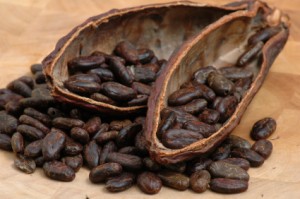From MIT’s magazine Technology Review, a small cockle-warming story by Corby Kummer to curl up with in front of the fire.
A yuppie San Francisco chocolate maker called Tcho has gone beyond selling high-priced speciality chocolate squares.
The company does something new: it provides growers with all the tools they need to have chocolate tastings during harvesting and processing, the crucial period that determines the price a cacao farmer’s crop will command. Tcho combines coffee roasters, spice grinders, and modified hair dryers to equip “sample labs†— pilot plants that produce tiny lots of chocolate right where cacao is grown. The company gives cacao farmers customized groupware so that they can share tasting notes and samples with chocolate makers. In this way, the farmers can bring entire harvests up to the standards of Tcho or any other buyer.
This is big news for the cocoa growers in Ghana, Ecuador, and other poor producing countries. For most crops, the seller has a good idea of the quality. A coffee grower can readily roast a few beans and brew up a cup.
The result has been an unusual market information asymmetry. The sellers of horses, used cars, antique furniture and many other products know more about their qualities and defects than the buyers. The cacao grower knows less about his beans than the buyer from Nestlé or Hershey. Tcho’s little invention should restore parity of information, and empower the growers to make their own choices about quality. Yum!
We often underestimate the importance and the difficulty of ensuring that markets have good information about quality as well as price. A price has one dimension; even a simple product like a carrot has at least six dimensions of quality - weight, size, shape, colour, crunchiness, sweetness, acidity. (Carrot connoisseurs will add some more dimensions of flavour.) A complex product like a car or wine has dozens of qualitative dimensions. Some of these can be assessed intuitively with sufficient accuracy, like the carrot’s crunchiness; others measured, like the car’s turning circle. But in many cases we have poor intuitive judgement, like the comparative weight of bags of staple foods; and in others measurement is problematic, like the bouquet of a wine.
A well-functioning market has to address these problems, and they are not easy - and only some are reliably self-regulating. Weights are prone to cheating from our poor intuitive judgement, so from Hammurabi the state has tried to impose accurate standard weights. Non-measurable qualities like odour and flavour are prone to manipulation by suggestion. When you reach complex technology, as with electronics, the buyer has to rely on evaluations by independent third parties whose motivation, she hopes, is more reputation than profit. Even so, the priorities of even disinterested experts - say automotive and IT journalists - may be very different from those of ordinary consumers.
The problem of price information in Africa has been more or less solved by the recent explosive adoption of the mobile phone. Building up the institutions for qualitative information will take much longer. Tcho has taken a good small step. Let’s hope others follow.
I had Tcho a few years ago when I stopped by after seeing it on a walk down Embarcadero while visiting SF. Yuppie or not, it’s very good chocolate. Nice to see them doing some good work socially as well.
Just imagine what kind of market you can have when the (oligopsonist) buyer can tell the seller “No, your product isn’t of good quality” and the seller has no way of disagreeing with them
YES! YES! YES!!!
I’ll have what she’s having.
Isn’t it coffee adverts that go in for soft porn instant seduction?
I’ve seen some pretty suggestive choco ads too.
I’m a pretty easy sell — I even like those dorky sayings they put in with the Dove bites. Though the 85% Valrhona from TJ’s is my favorite. I used to like the Cluizel a lot too but I have to go out of my way for that.
If chocolate is like coffee (about which I know much more), it’s not just the ability to bargain better that this investment enables-it’s the ability to actually make a better product. The ability to answer “should I dry this for another day?” in terms of quality impact is huge.
Absolutely. I muffled this point a bit by framing it in terms of choice. Everybody will want to maintain a decent quality standard; not all will decide to go for the high-quality market, selling to demanding purchasers like Tcho. Richness of flavour usually correlates with restricted yields, difficult plant varieties, careful picking, and good soil.
It would however take a lot of labs, in fact new technology, to allow the cacao farmers to answer your specific question.
Great idea, especially if it helps the farmers engage an economic benefit which actually tasting the product is sure to do.